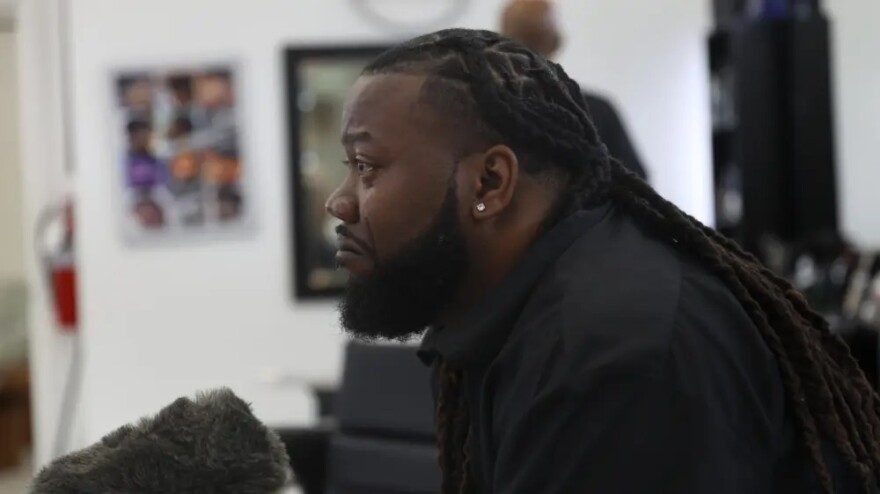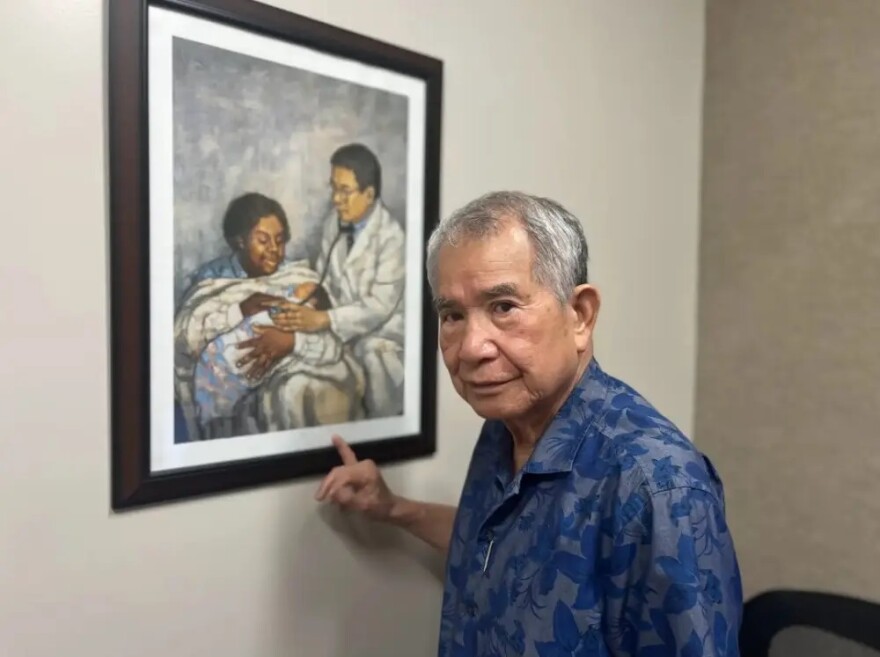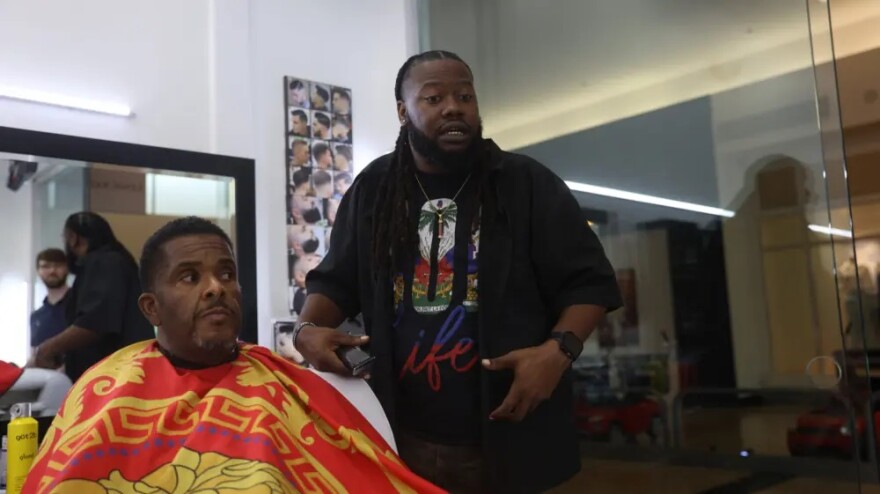When Jermaine Moore needs a haircut, he looks for barbers from New Orleans. At a Shaving Grace barbershop in the southeast Houston area, he's found one.
"New Orleans barbers cut different," Moore said. "Our hair texture is different. This is not processed, this is my mother. But everybody can't cut it."
Moore is retired now. Before 2005, he lived a comfortable life as an IT professional in New Orleans. That changed after Hurricane Katrina destroyed his home in 2005.
While staying with family in Houston, he turned on the TV — and saw his house in the floodwaters.
"Yeah, saw my damn house on the news ... watched everything float away, and looking down at that overnight bag, realizing that, and my truck outside, that’s all I got left," Moore said.
After the storm, he went back to New Orleans to survey the damage, and that's when he realized he would have to stay in Houston.
"You know what it’s like to stand in an American city and hear not a bird chirp, not a cricket ... you hear nothing," Moore said. "And you start to wonder, can I live here?"
RELATED: It was the costliest hurricane in U.S. history: Have we forgotten Katrina’s lessons?
Many residents of New Orleans were asking the same question. They went from finding temporary homes in Houston and other Texas cities to settling down for the long-term.
Twenty years later, they've changed Houston — and Houston has changed them.
‘Blessing and a curse'
Jermaine Moore met his wife in Houston. He also found a barber from New Orleans.
John "Speedy" Riddle started cutting hair about a decade after he arrived in Houston at the age of 15.

His family home also flooded during Katrina, and aside from short visits, his family never returned. Still, he finds meaning in the loss.
"I would have never got to live the life I’ve experienced up to 35 years old ... if it wouldn’t have been for Katrina," Riddle said.
Riddle was among as many as 6,000 students from New Orleans who came to the Houston Independent School District after Katrina interrupted the beginning of their school year.
They knew each other for a week before Riddle cut Moore's hair, but as they shared memories, it sounded like they had been talking for a lifetime.
"We seek each other out for the connection," Moore said.

The memories of the evacuation still bring tears to Riddle's eyes — but Moore says there's more to the story than pain.
"Katrina hurt, but you’re supposed to find a blessing in a curse," Moore said.
"I finished high school out here," Riddle said, pausing the haircut. "I don’t think I would have — at 15, the life I was living in New Orleans, the things I got away with that my parents don't know — I wouldn’t have made it. I wouldn’t have lasted this long."
"Right, see, Houston for him at 15, showed him a completely different path," Moore said. "He lost his community in New Orleans — the curse. The blessing — look at him."
The overlooked evacuees
The evacuating population, like Houston, was diverse.
Bong Mui is a physician and was among the estimated 15,000 people from Louisiana’s Vietnamese community who came to Houston after Hurricane Katrina. His home and family medicine clinic flooded during the storm.
"I really love New Orleans, and I really wanted to come back," Mui said, "but when I came back, and I saw that everything was completely destroyed ... you know, I just couldn’t go back."

He had fallen in love with the Crescent city when he attended his first Mardi Gras celebration in the 1970s. Over the next three decades, he was immersed in the city's multiculturalism and special events.
"What I miss is the culture in New Orleans … the jazz music … the French, the Spanish flavor … I just love it," Mui said.
He was already familiar with loss.
RELATED: A retired general recalls Hurricane Katrina’s chaos and lessons still unlearned
He was 8 years old when Vietnam was split in 1954, and his family left everything behind during the move from the communist north to the south. Twenty years later, he was studying in the U.S. when Saigon fell, and he wasn't able to return.
After the hurricane in 2005, he was forced to start over for the third time. He brought his family to Houston and opened a new clinic. He felt at home among the larger Vietnamese community, which he said was more lively than the fishing communities of Louisiana.
"In New Orleans, the majority of them are fishermen and things like that, and there’s some cultural thing going on, but there’s nothing as compared to Houston," he said.
The Vietnamese population in the Houston area has boomed — from just under 60,000 in 2005 to about 140,000 in 2025, according to the Pew Research Center.
"I’m still feeling a bit sad, but I’m happy with my life here," Mui said. "I was able to be close to my siblings and close to my friends and, particularly, I’m happy with the growth of the Vietnamese community here."
A changing Houston
After the hurricane, at least 100,000 people found refuge in Houston, according to Jim Elliott, co-director at the Center for Coastal Futures & Adaptive Resilience at Rice University in Houston.
"We have to keep in mind that this was the largest evacuation in terms of numbers and completeness in U.S. history," Elliott said.
According to Elliott, it's difficult to put an exact figure on how many evacuees came to Houston. He said the number could range from 100,000 to 300,000.
Those who came changed the culture.
"We have an incredibly diverse city, so what the New Orleanians did, I suspect, is they entered into this sort of gumbo, if you will, and began to add a little bit of this and a little bit of that," Elliott said.
It's also hard to say how many Katrina evacuees are still in Houston 20 years later.
But their cultural contribution is undeniable — from Cajun flavors at crawfish boils to the widely popular White Linen Night block parties in the Houston Heights neighborhood.

Two decades after Hurricane Katrina, those New Orleanians — including Jermaine Moore and John "Speedy" Riddle — see Houston as a place of new beginnings, opportunity and community.
They also see more of New Orleans in Houston.
"The good part that has changed — our influence. I can find daiquiris now," Moore said, as Riddle enthusiastically agreed. "I can find food like home now ... Couldn’t find that 20 years ago, so there’s the change. I can find more remnants of home, actual home. Twenty years ago, we were a fish out of water."
They say with the curse of losing home, there's also the blessing of finding — and changing — Houston.
Copyright 2025 Houston Public Media News 88.7

